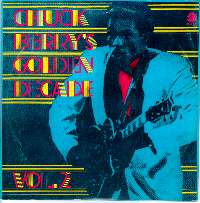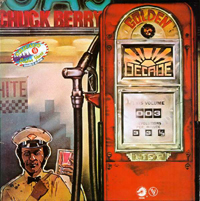| Chuck Berry's Golden Decade | |
|---|---|
 | |
| Compilation album by Chuck Berry | |
| Released | April 1967, 1973, 1974 |
| Genre | Rock |
| Label | Chess |
| Volume 2 cover | |
 | |
| Volume 3 cover | |
 | |
| Review scores | |
|---|---|
| Source | Rating |
| Volume 1 Allmusic | |
| Volume 2 Allmusic | |
| Volume 3 Allmusic | |
| Encyclopedia of Popular Music | |
Chuck Berry's Golden Decade is a compilation of music by Chuck Berry,released in three volumes in 1967,1973,and 1974. Covering the decade from 1955 to 1964,each volume consists of a two-LP set of 24 songs recorded by Berry. The first volume reached number 72 on Billboard's Pop Albums chart. [5] The second volume peaked at number 110. [6] The third volume,which included only two hit singles among its tracks,did not chart.
Contents
- Track listing
- Chuck Berry's Golden Decade
- Chuck Berry's Golden Decade Volume 2
- Chuck Berry's Golden Decade Volume 3
- Personnel
- References
The first two volumes were critically well received. In 1967, Rolling Stone noted that the first volume was "the album you must get" when "looking for the Chuck Berry standards". [7] The album was included in Robert Christgau's "Basic Record Library" of 1950s and 1960s recordings,published in Christgau's Record Guide:Rock Albums of the Seventies (1981). [8]
All three volumes are out of print.